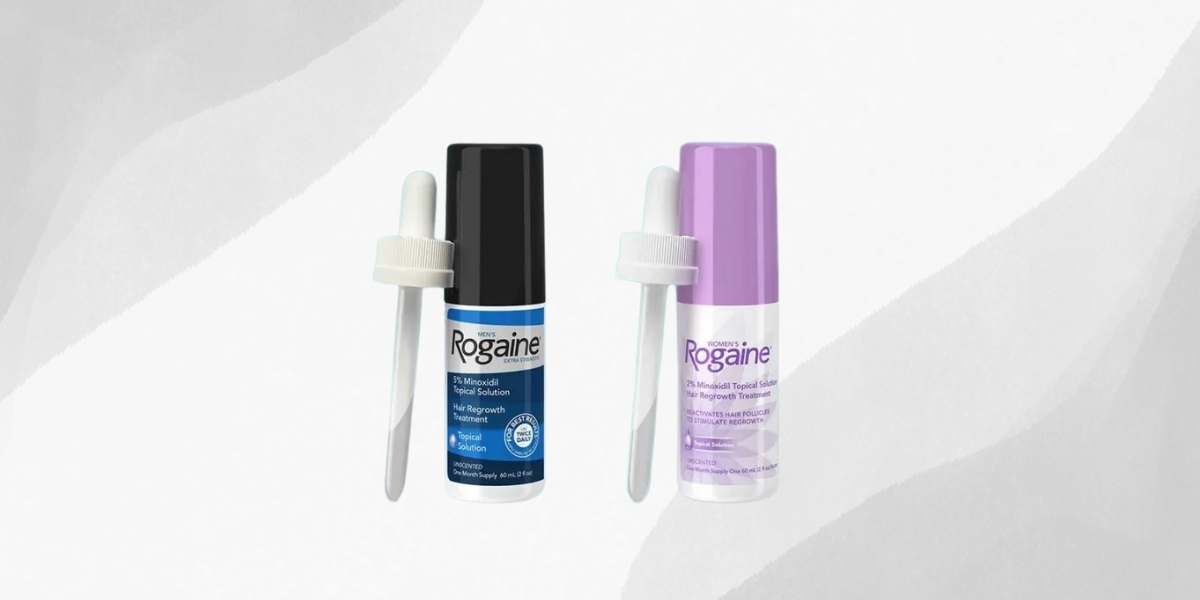For many people, experiencing hair loss can be a stressful and distressing event they go through. In order to address their concerns over hair loss, a significant number of people are turning to hair growth medications that are available without a prescription, such as Rogaine. Before beginning to use Rogaine, it is essential to have a thorough understanding of the potential adverse effects due to the fact that it has been demonstrated in clinical studies to be efficient in boosting hair growth. In the next blog post, we will discuss the possible adverse effects of Rogaine as well as the information that you need to be aware of before using it.
How does Rogaine work?
Minoxidil, which is also known as Rogaine, is a drug that can be purchased without a prescription and is used to stimulate the growth of hair. The application of this product to the scalp is normally done twice daily, and it is available in both a foam and a liquid form. There is an increase in the amount of oxygen, blood, and nutrients that are able to reach hair follicles as a result of Rogaine’s ability to enlarge blood vessels in the scalp. This increased blood flow has the potential to result in enhancements to hair growth.
Rogaine Side Effects
While Rogaine is generally considered to be safe, it is essential to be aware of the potential side effects that may occur. One of the most common adverse reactions of Rogaine is irritation of the scalp, which can result in redness, itching, and dryness of the scalp itself.
- Other possible side effects include the following:
- During the first few weeks of using Rogaine, you may experience an increase in the amount of hair that you lose. On the other hand, this condition is often just brief and serves as an indication that new hair growth is increasing.
- Rogaine is absorbed into the bloodstream through the scalp, which can cause dizziness or lightheadedness.
- The occurrence of chest pain or increased heart rate is another uncommon adverse reaction that may take place as a result of the absorption of Rogaine into the bloodstream.
- Rogaine has the potential to cause women to experience undesirable facial hair growth in isolated instances.
Who Should Stay Away From Rogaine?
Rogaine is not appropriate for use by most people. Before beginning treatment with Rogaine, it is essential to consult with a medical professional or a hair transplant specialist. Rogaine should be avoided by the following individuals, among others:
All women who are pregnant or breastfeeding: There is a lack of complete understanding regarding the safety of Rogaine used during pregnancy or while breastfeeding. Prior to utilizing Rogaine during this critical period, it is essential to consult with a medical professional.
Rogaine has the potential to be absorbed into the bloodstream, which leads to adverse effects on the heart in individuals who have a history of heart disease. Before beginning to use Rogaine, individuals who have a previous history of heart disease should consult with their physician.
People who already have a scalp issue: Because Rogaine has the potential to irritate the scalp, those who already have a scalp condition should consult a physician before getting started with Rogaine.
How to Reduce the Potential Side Effects
Before beginning to use Rogaine, it is essential to carefully follow the directions and consult with a medical professional or a hair transplant specialist in order to reduce the likelihood of experiencing any adverse effects. Some helpful hints to bear in mind are as follows:
Make sure to only use Rogaine as directed: You should apply Rogaine to your scalp twice a day, and you should not exceed the dosage that is suggested.
Ensure that Rogaine is kept away from the lips and eyes: Keep Rogaine away from your mouth and eyes since it can be hazardous if it is swallowed. Rogaine should be kept away from this area.
On skin that has been burnt or inflamed, Rogaine should not be applied: A skin that is already sensitive may experience further discomfort when using Rogaine.
When Should You Seek the Advice of a Medical Professional?
It is normally safe to take Rogaine; nevertheless, there is a possibility that some individuals may develop adverse effects that require medical treatment. In the event that you develop any of the following symptoms, you should immediately discontinue the use of the product and seek medical attention:
- A severe inflammation of the scalp
- Pain in the chest
- Symptoms of lightheadedness or dizziness
- Irregular heart rate
- Hand or foot swelling is a common symptom.
- Gaining weight all of a sudden
- Loss of hair for no apparent reason
Before beginning to use Rogaine, it is essential to make sure that you have consulted your physician; this is especially true if you are pregnant or breastfeeding. Given the small amount of study that has been conducted on the subject of Rogaine’s safety during pregnancy or while breastfeeding, it is advised to err on the side of caution and seek the opinion of a medical professional.
Rogaine Alternatives
Alternative therapies are available to you in the event that you discover that Rogaine does not work for you or if you are concerned about the potential adverse effects of the medication. Options include the following:
Hair transplant: In the event that you are experiencing significant or permanent hair loss, a hair transplant might be the best recommended treatment option. The process of hair transplantation involves the transfer of hair follicles from regions of the scalp that are experiencing healthy hair growth to regions of the scalp that are experiencing thinning or balding. Another one of the services that we do is hair transplantation, which is a process that is frequently performed in clinics such as ours.
Finasteride:The medication known as finasteride is taken orally and is prescribed to patients who suffer from male pattern baldness. It achieves its effect by inhibiting the production of a hormone that is responsible for hair loss. There are some potential adverse effects associated with finasteride, including diminished sex drive and impotence. Finasteride is generally well tolerated.
Low-level laser therapy: refers to a non-invasive treatment that involves the utilization of a specialized light instrument in order to encourage the development of hair. Despite the fact that this treatment is risk-free and does not have any known adverse effects, it might not be helpful for everyone.
Final Thoughts
In spite of the fact that Rogaine is a well-liked over-the-counter therapy for hair loss, it is essential to be aware of the potential side effects that may occur. Some people may have scalp irritation, unwanted hair growth, or other adverse responses to the product despite the fact that the majority of people tend to tolerate it well. In the event that you suffer any of these adverse effects or have any questions regarding the use of Rogaine, it is highly recommended that you consult with a healthcare physician or a hair transplant specialist.
At Estevitalya, we provide a variety of therapies for hair loss, including hair transplants, with the goal of assisting our patients in achieving the full and healthy head of hair that they have always desired. Contact us right away if you are experiencing hair loss and would like to book a consultation and learn more about the various alternatives available to you.







